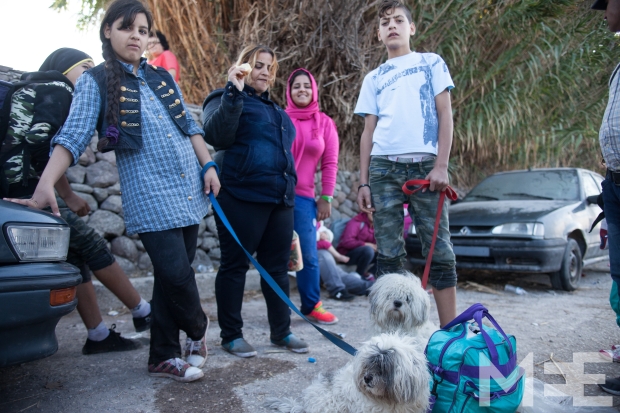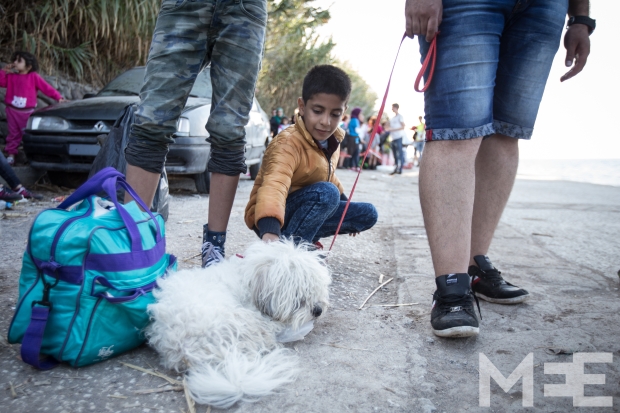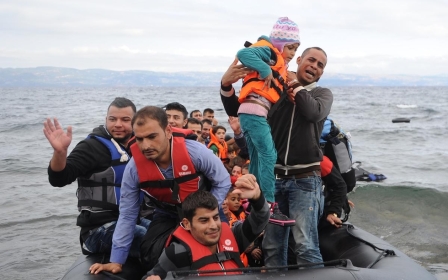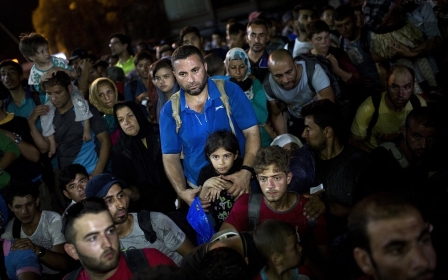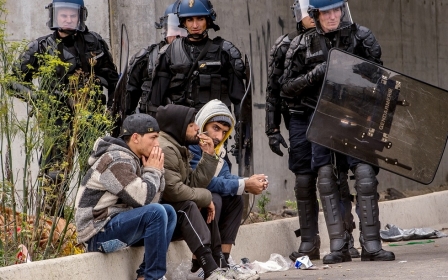Rose and Milo: Family dogs accompany Iraqi refugees to Europe
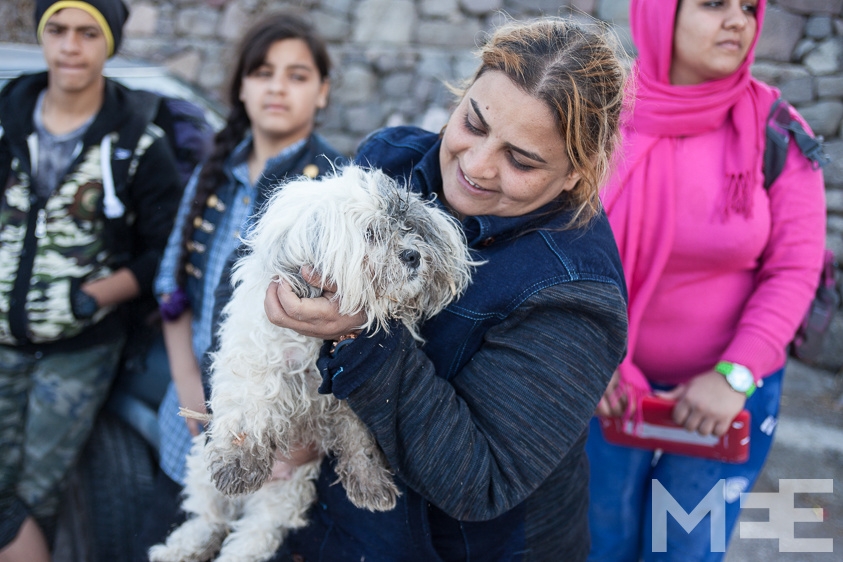
LESBOS, Greece - “I couldn’t leave them,” Eman Matrood Aazawi tells Middle East Eye as the coastal wind begins to pick up on the Greek island of Lesbos. “It’s Rose and Milo!”
Aazawi and her family fled Baghdad last month with seven other family members. “There is no peace there … People die there every day,” says 37-year-old Aazawi, her infectious smile leaving her. But she couldn’t leave Baghdad without taking Rose and Milo, the two family dogs, along for the journey.
Rose and Milo, two Havenese mixed-breeds, seem oblivious to the chaos happening around them. Volunteers from Greece and throughout Europe mill around, frantically trying to give out dry clothes to sea-soaked children. Doctors attempt to communicate with hand signals to elderly and ill refugees, with broken English and rudimentary Arabic being used to try and diagnose sometimes complex illnesses.
All the volunteers and refugees seem to find time, however, to come and dote over the two shaggy dogs that have made it over the Aegean Sea with this newest group of Iraqi and Syrian refugees. Family members take turns walking the dogs up and down a small stretch of road as other refugees wring out damp clothes at the side.
“We have another 11 dogs back in Baghdad, but we couldn’t take them all, so we gave the others away to friends still there,” Aazawi says, before reeling off the names of some of the remaining dogs left behind - Jack, Julie, Simsim. Leaving them behind was hard, Aazawi admits, but taking all of them would have been impossible.
The Greek island of Lesbos has become a gateway to Europe for refugees fleeing war and violence in the Middle East and beyond. The roughly seven-kilometre crossing over the Aegean Sea from Turkey can be done in just over an hour in favourable conditions, but up to six hours in stormier weather. The passage is treacherous. Overcrowded plastic dinghies crammed with refugees can capsize, and in rough seas the boat engines routinely fail.
Drowning is a dangerous possibility, while hypothermia has resulted in deaths before. On the same stretch of Lesbos coast that Aazawi and her family crossed, on the same week, a 10-month-old baby died of hypothermia after being dropped overboard. By the time the plastic dingy had made it to shore, medics were unable to resuscitate the child.
Sitting on the side of the coastal road that runs along the north of the island, Aazawi breathes a sigh of relief.
“It was so dangerous,” she says when asked about the sea crossing that she had made just minutes before. The plastic dinghy she travelled in was crammed with dozens of other refugees. By the time it had reached Greece, seawater had flooded the base of the boat, much longer on the sea and the dinghy would have been in grave danger.
As Aazawi speaks, the sea is calm, water gently washing against the rocks where the boat landed. Two miles out to sea, the serene beach atmosphere is long gone, currents are strong and waves splash over the flimsy plastic boats threatening to muster enough power to flip the black dinghies over and knock people overboard. The Aegean Sea claims the lives of refugees weekly. Alan Kurdi, the three-year-old Kurdish boy from Kobane whose lifeless body was photographed on Bodrum beach in Turkey, has become the sea’s most well-known victim.
“We tried three times to get going but they [the Turkish coastguard] pushed us back,” Aazawi says, recalling the journey. “But on the fourth time we succeeded. The waves were crashing into our dingy all the time.”
Aazawi and her sister-in-law Zaynab couldn’t even hold onto the sides of the boat as it rocked from side to side taking on water. Aazawi had her arms securely round Rose and Zaynab clutched Milo during the two-hour trip across the Mytilene Strait between the island and the Turkish coast.
“But they just slept in the dinghy for the whole journey,” Zaynab says, laughing a little at the notion that anyone or anything could possibly nap during the terrifying two-hour trek.
“I couldn’t hold onto anything as he was sitting on my lap,” she continues, pointing down at Milo. “I was holding him. I was scared a lot, but the dogs just slept.”
“Europe’s so beautiful,” Zaynab suddenly exclaims while walking down the coastal road.
The green backdrop of eucalyptus trees set against Lesbos’ largest mountain contrasts with the sudden change to calm blue ripples of water that get steadily darker as the eye follows the currents out to sea. It’s hard to imagine that the expanse can be both a gateway and a graveyard for desperate refugees attempting to forge a new life away from the shadows of bombs and militias wielding guns.
“Rose is Milo’s mother,” Aazawi chimes in when the conversation moves back to the family’s canine companions. “So we had to bring them both together. They’re related.”
The beaches of Lesbos are filled everyday with families, friends and young couples sharing a collective sigh of relief as they set foot on land, feeling finally, in a place that feels safe. The arduous trek towards preferred destinations of refuge, such as Germany and Sweden, is long and difficult. Yet for many refugees, that trip, just like the boat journey before and the new life that is formed after it, is at least carried out alongside loved ones. A shared experience through the tribulations, trauma, but also newfound optimism, of a refugee fleeing a war-ravaged home.
Both Eman and Zaynab know the coming years will not be an easy ride. As Eman looks to restart a career in hairdressing in Germany, and Zaynab hopes to begin studying computer engineering, they’re looking to the future, both happy they can continue to share that with Milo and Rose. A little slice of their home in Baghdad that will follow them to a new life in Germany.
New MEE newsletter: Jerusalem Dispatch
Sign up to get the latest insights and analysis on Israel-Palestine, alongside Turkey Unpacked and other MEE newsletters
Middle East Eye delivers independent and unrivalled coverage and analysis of the Middle East, North Africa and beyond. To learn more about republishing this content and the associated fees, please fill out this form. More about MEE can be found here.


